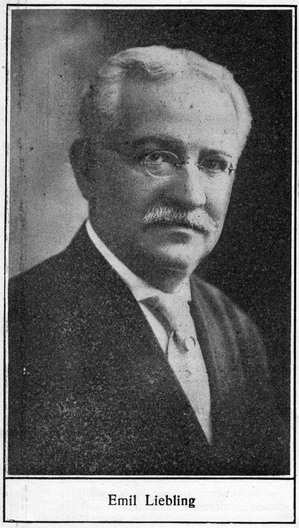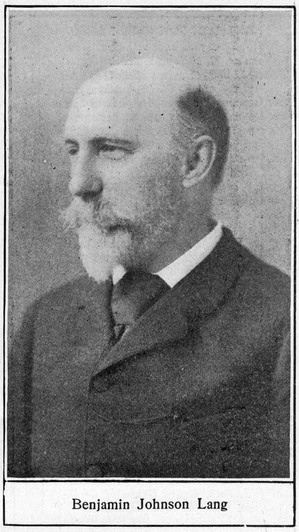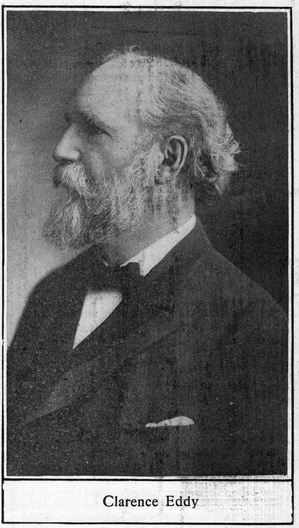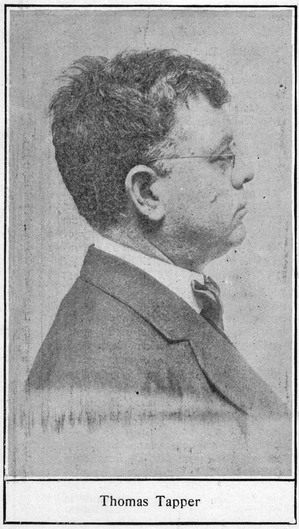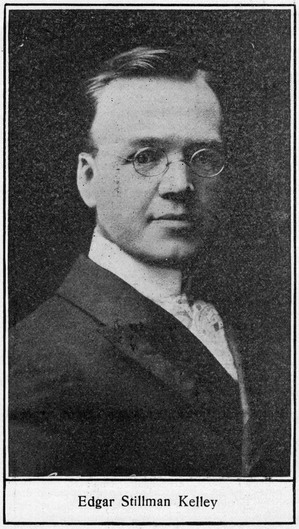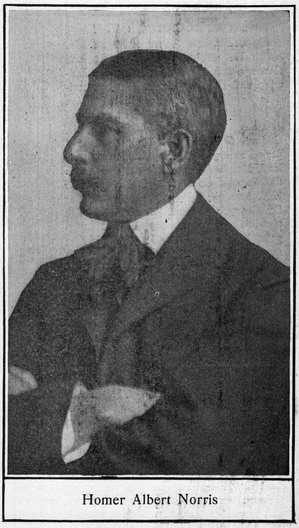Mr. Liebling was born in Pless, Silesia, April 12, 1851. He came to America early in life, and was soon engaged in teaching in schools and colleges. As soon as circumstances permitted he returned to Berlin, where he became a pupil of Kullak, Ehrlich and Liszt. He became a member of a distinguished group of students, which included Sherwood, Moszkowski, Scharwenka, etc. On his return to America he established himself in Chicago, and soon became one of the foremost among those engaged in musical life in the Lake City. He has repeatedly appeared in concerts in the leading American cities, and has been frequently heard with the Thomas Orchestra. Mr. Liebling is not only an excellent concert pianist, but is also a first-rate teacher, lecturer and writer on musical subjects. His versatility is very remarkable, and his contributions to The Etude and other musical journals have been of great value, and interest to music students. In his work as a composer, he has earned a well deserved reputation and many of his salon pieces, such as the Florence waltz, and the Gavotte-Moderne, are deservedly popular. As a pianist, Mr. Liebling is remarkable for his catholicity of taste, and for his great breadth of sympathy. There are few Bach players to equal him in the country, and yet he is equally at home in the music of Liszt.
B. J. Lang was born at Salem, Mass., December 28, 1837, and died in Boston, April 3, 1909. He first studied with his father, and with F. G. Hill, but later went to Germany and became a pupil of Liszt and others. He returned to Boston and became organist at Old South Church for twenty years, and also at King’s Chapel. He was for twenty-five years organist of the Handel and Haydn Society, and conductor of that institution, 1895-96. He was conductor of the Apollo Club, 1868-1901, of the Cecilia Society, 1874-1907, and of the Checkering Production Concerts, 1904. As a teacher he has had a great influence on American music, and among the most distinguished of his pupils may be mentioned Apthorpe, Ethelbert Nevin and Arthur Foote. He was one of the first in this country to appreciate the genius of Richard Wagner, and devoutly believed that a time would come when Wagner would be regarded as worthy to rank with Beethoven himself. It is hard at this period to realize that there was a time when Wagner’s phenomenal genius was even questioned, but such a time existed, and Lang was a valiant fighter for the truth. He also brought out several important works, new and old, which had hitherto been unheard in America, including the B Minor Mass of J. S. Bach, Elgar’s Dream of Gerontius, and works of equal importance.
Clarence Eddy was born at Greenfield, Mass., June 23, 1851. He received some musical instruction in his native town until he was sixteen, when he became a pupil of Dudley Buck at Hartford, Conn. Within a year he was appointed organist at a church in Montpelier, Vt. In 1871 Eddy went to Berlin where he made rapid progress under Haupt and Loeschhorn. After two and a half years’ study he made a successful concert tour through Germany, Austria, Switzerland and Holland. He returned to America in 1874 and was appointed organist of the First Congregational Church, Chicago. He became head of the Hershey School of Musical Art in 1876, and brought the institution to a high pitch of perfection in training singers and organists. He gave one hundred unique weekly recitals on the school organ, and several famous composers wrote pieces for the hundredth concert in 1879; From 1908 to 1910, Eddy was organist at Tompkins Avenue Church, Brooklyn, and he has filled various important posts as conductor, etc. Eddy’s compositions include preludes, canons and fugues, and many excellent arrangements and transcriptions for the organ. He also translated and published Haupt’s work on Counterpoint. He toured Europe with great success in 1897-98, and has a reputation in this country as an organ recitalist who is second to none.
Thomas Tapper was born at Canton, Mass., January 28, 1864. He studied at the American College of Musicians, and later spent some time in Europe, where he studied music with leading authorities. In 1895 he married Bertha Feiring Maas, the well-known Norwegian pianist. Mr. Tapper has been very successful as a lecturer and writer upon musical subjects, more especially devoting himself to musical education. He is lecturer and instructor at the Institute of Musical Art in New York, and also Principal of the Music Department of the University of New York. He was editor of The Musical Record and Review, 1903-1904, and of The Musician, 1904-1907, and is at present editor of the Extension Bulletin (school music) of New York, and a special writer for the New York Evening Journal. He is also a member of the editorial staff of the American Book Company. Many of his books upon musical subjects have proved very popular, the following being perhaps the best known: First Studies in Musical Biography, Chats with Music Students, Music Talks with Children, and Pictures from the Lives of Great Composers. Mr. Tapper received the degree Litt. D. from Bates College in 1911 in recognition of his services to the educational world. Mr. Tapper has been a frequent contributor to The Etude.
Mr. Kelley was born at Sparta, Wis., April 14, 1857. He was first attracted to music by hearing “Blind Tom,” the idiot-genius, and took his first lessons from F. W. Merriam. He afterwards went to Chicago, where he was a pupil of Clarence Eddy and Ledochowski, Four years in Stuttgart followed under Seiffritz, Krüger, Speidel and Friedrich Finck, Upon returning to America he became active as a teacher and organist in San Francisco. He was also music critic to the San Francisco Examiner from 1893 to 1895. For about ten years Mr. Kelley taught in Berlin, but now holds a Composition Fellowship in Western College, Oxford, Ohio, and is also director of composition at Cincinnati Conservatory, He first attracted attention as a composer by his incidental music to Macbeth, which was successfully produced while he was in San Francisco. His works include a comic opera, Puritania, incidental music to Ben Hur, and a symphony dealing with Gulliver’s adventures in Lilliput. His Aladdin suite is perhaps his most famous work, and in this he has put to full use his unique knowledge of Chinese musical idioms, gained while on the Pacific coast, Mr. Kelley has published many shorter works, including the popular song, The Lady Picking Mulberries, in which striking Chinese effects are again employed. Curiously enough, many of Mr. Kelley’s best musical ideas have come to him in his sleep.
Homer Norris was born at Wayne, Me., 1860. He studied at the New England Conservatory under Marston, Hale, Chadwick and Emery. Unlike many Americans he chose to complete his education in France rather than Germany, and became a pupil in Paris of Dubois, Godard, Guilmant and Gigout. After a period as organist in Lewiston and Portland, Me., he became organist at Ruggles St. Baptist Church in Boston. Since 1904, however, he has been organist at St. George’s Church, New York. His text-books on Harmony and Counterpoint have won him wide recognition on account of his original theories, which are put to practical use in his own compositions. In the larger forms, he has written a concert Overture, Zoroaster, and a cantata, Nain, both of which contain striking effects. His songs include many favorites such as Alleluia, Land of Nod, Three Roses Red, and There, Little Girl Don’t Cry. One of the most popular of his songs is his earliest, the well-known Cradle Song. He has naturally devoted a great deal of his talent to writing sacred music, and his Lamb of God, for mixed chorus, is a fine example of his work in this direction. Mr. Norris is a busy man, and is therefore not able to devote as much time to composition as many of his admirers would wish, but what he has written is along lines that are distinctly his own.


